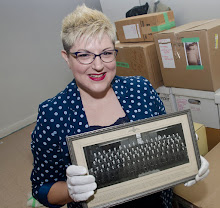I had a wonderful car moment last night when I was driving home from work. I was sitting in traffic on Davenport listening to Disc Drive on CBC2, when I glance out my window at the car exactly beside me. There, stopped in traffic heading the other way, was an almost identical Subaru - a slightly later model Loyale, I think. Even the colour was almost the same. The woman behind the wheel, in her later middle age with a similar style as my mother, was looking at Scarlette with a big smile on her face. I grinned and gave her the thumbs-up, which she answered with her own. Hurray for old-school Subaru owners !
So, it turns out that the only person to remark on my entry about apostrophes and Old English was Tanya, who got quite professorish at me as she gave me a lecture about Old English vs. Middle English. Usually, such emails come from Nick, so this was a bit of a surprise. Of course, I'm opting to completely disregard her opinion, because... well, because I can. Hah ! Anyway, at least the entry sparked some controversy, though not at all about apostrophes or semi-colons. Actually, Tanya's email was quite interesting and did spark some return discussion from me. She's right, but I think I'm also right, at least to a degree, and maybe we'll have to leave it at that. The thing with history, especially the history of language, is that since no one was THERE to record it, we cannot ever know for sure. Maybe, to better qualify terms like Old English, we should make a broader scale that reflects demographic changes and whatnot.
Proto English - pre 300CE
Early English - 300-1066CE
Old English - 1066-1350CE
Middle English - 1350-1700CE
Modern English - 1700 onward
American Spelling - ongoing problem
And then anyone who deviates from said scale, can be drawn and quartered, or beheaded, or flayed, or hanged, or shot, depending on the time period they're referring to. Is that a bit over the top? Perhaps. Okay, well, I still think my list should stand. Tanya, your thoughts? ;)
A little piece of my mind, for what it's worth
About Me

- MiRSCH
- Museum professional, PhD student, adventurer, cat-mom, day-dreamer. Working hard at all four. Bad at math.
Recent deviations
MiniMeanderings
Some Favourite Reading
- 1984 - Orwell
- Box of Delights, The - Masefield
- Chronicles of Narnia, The - Lewis
- Frankenstein - Shelley
- Good Omens - Pratchett/Gaiman
- Great Expectations - Dickens
- Mirror of the Artist, The - Harbison
- Neuromancer - Gibson
- Phantom Tollbooth, The - Juster
- Tennant of Wildfell Hall, The - Bronte, A.
Blog Archive
- October 2001 (14)
- November 2001 (27)
- December 2001 (16)
- January 2002 (29)
- February 2002 (17)
- March 2002 (18)
- April 2002 (21)
- May 2002 (26)
- June 2002 (16)
- July 2002 (9)
- August 2002 (13)
- September 2002 (12)
- October 2002 (18)
- November 2002 (12)
- December 2002 (13)
- January 2003 (13)
- February 2003 (12)
- March 2003 (13)
- April 2003 (13)
- May 2003 (20)
- June 2003 (9)
- July 2003 (16)
- August 2003 (15)
- September 2003 (15)
- October 2003 (11)
- November 2003 (14)
- December 2003 (14)
- January 2004 (12)
- February 2004 (9)
- March 2004 (8)
- April 2004 (8)
- May 2004 (6)
- June 2004 (8)
- July 2004 (7)
- August 2004 (5)
- September 2004 (7)
- October 2004 (6)
- November 2004 (5)
- December 2004 (10)
- January 2005 (6)
- February 2005 (7)
- March 2005 (6)
- April 2005 (9)
- May 2005 (6)
- June 2005 (6)
- July 2005 (3)
- August 2005 (6)
- September 2005 (3)
- October 2005 (5)
- November 2005 (2)
- December 2005 (7)
- January 2006 (1)
- February 2006 (3)
- March 2006 (6)
- April 2006 (2)
- May 2006 (7)
- June 2006 (3)
- July 2006 (3)
- August 2006 (1)
- September 2006 (3)
- October 2006 (3)
- November 2006 (3)
- December 2006 (2)
- January 2007 (2)
- March 2007 (1)
- April 2007 (1)
- May 2007 (3)
- July 2007 (47)
- August 2007 (3)
- September 2007 (4)
- October 2007 (4)
- June 2008 (2)
- August 2008 (2)
- September 2008 (2)
- November 2008 (1)
- December 2008 (1)
- February 2009 (1)
- March 2009 (2)
- April 2009 (1)
- August 2009 (1)
- March 2010 (1)
- July 2010 (1)
- September 2010 (1)
- November 2010 (1)
- June 2011 (1)
- July 2011 (1)
- September 2011 (1)
- October 2011 (3)
- November 2011 (2)
- July 2012 (1)